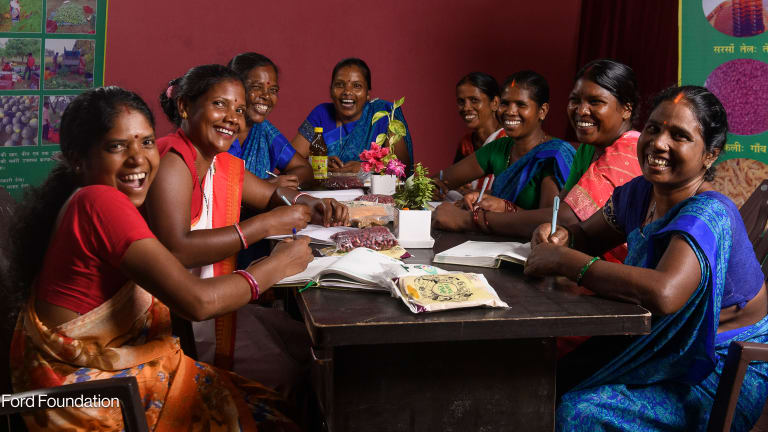
Four philanthropic organizations, including the Ford Foundation and Open Society Foundations, this week joined the Biden administration to formally launch a new initiative to support collective bargaining globally and “prioritize workers rights as core to democracy.”
The funders group, which also includes the U.S.-based Humanity United and Panama’s Fundación Avina, are part of the Biden administration’s Multilateral Partnership for Organizing, Worker Empowerment, and Rights, or M-POWER, which was launched at the U.S. Department of Labor in Washington, D.C., on Thursday.
M-POWER seeks to promote the use of collective bargaining, overhauls of labor laws and enforcement, and “free and independent” trade unions. Those things are fundamental to upholding democracy and preventing the rise of authoritarianism around the world, the foundations said, adding that progress on labor protections has stalled or eroded since the start of the COVID-19 pandemic. Even before M-POWER’s launch, the foundations had committed nearly $100 million to support workers’ rights this year.
The idea of M-POWER was developed at the U.S. Summit for Democracy hosted in Washington last December. It aims to include philanthropic organizations, governments, and worker and labor groups among its membership.
The U.S. Departments of Labor and State and U.S. Agency for International Development have committed roughly $130 million to M-POWER. It’s the U.S. government's largest-ever commitment to advancing workers’ rights internationally. The governments of Argentina, Canada, Germany, South Africa, and Spain also have joined the initiative.
“The strength of any democracy depends on listening to, uplifting, and investing in the voices of workers and labor rights defenders who are calling for improved wages and working conditions and equitable economic growth for all, Sarita Gupta, the Ford Foundation’s vice president of U.S. programs, said in a statement.
“Worker organizations are really the bedrock of democracy. And I think OSF’s work on democratization and countering authoritarianism recognizes that democracies need to deliver beyond the ballot box,” Elizabeth Frantz, OSF’s deputy director of equity, told Devex.
OSF pledged roughly $25 million to support workers rights issues around the world this year, she said.
M-POWER members, including U.S. government officials, held a meeting Wednesday to begin developing a “sharpened approach” to tackling the issue, Gupta told Devex. Part of that strategy could include working together to identify projects and regions where there is a “huge opportunity” to address workers’ needs, she said.
Since last December, founding members of M-POWER have been “workshopping” ideas on how best to address the issue, including considering where each member is already investing and how to “buoy” or “ amplify” those investments, Gupta said.
The four foundations had already been working together as part of Funders Organized for Rights in the Global Economy, or FORGE — a collaborative philanthropy group that funds worker-led movements and related initiatives. Each has highlighted areas where they would like to see more progress.
Strengthening access to collective bargaining and freedom of association is critical to ensuring protections for the “most vulnerable workers,” said Philippe Sion, managing director at Humanity United, in a statement. Collective bargaining refers to negotiations between an employer and employee or labor organizations to determine working conditions and terms of employment. Meanwhile, freedom of association refers to individuals’ right to interact, organize among themselves, act as a collective, and pursue common interests.
The United Nations also has cited collective bargaining for benefits like flexible working arrangements and paid sick leave as “essential” to global recovery from the pandemic.
It is particularly important that migrant workers are protected, Sion said, as they are more likely to face labor exploitation.
Humanity United’s work focuses on forced labor and human trafficking as well as peace building and conflict prevention. The organization was created by eBay founder Pierre Omidyar and his wife Pam as part of their Omidyar Group of philanthropic and social impact initiatives.
Fundación Avina also wants to support the rights of workers “in the most vulnerable conditions, across sectors and supply chains,” said Valeria Scorza, the organization’s director of strategic partnerships, in a statement. The foundation has programs focused on democracy, migration, sustainability, and the future of work.
Scorza said M-POWER represented an opportunity to achieve systemic changes by building partnerships “rooted in trust, understanding, power sharing, and daring innovations.”
Individually, both Ford Foundation and OSF have made major commitments to support workers globally and to curtail the spread of authoritarianism. Promoting democracy and human rights has been central to OSF’s work since it launched. OSF spent more than $235 million on “democratic practice” and another roughly $136 million on “economic equity and justice” in 2020, according to its most recent financial data.
Ford Foundation, for its part, has established a Future of Work(ers) program focused on protecting labor and social protections for workers. The program has a $12 million annual budget and has access to another $37.4 million in additional funding through the foundation’s Building Institutions and Networks, or BUILD, program — a $1 billion initiative that provides multiyear, unrestricted funding to civil society organizations.
Last year, Ford Foundation also announced a five-year, $25 million commitment to women and others working in the informal workforce in roles such as street vendors and waste pickers. It also has partnered with Apple to develop a $10 million fund to support civil society groups working to expose the use of state-sponsored spyware on activists, journalists, lawmakers, and others.
A major focus for the Future of Work(ers) in the next year will be on reducing violence and harassment in the workplace, Gupta told Devex. More than 1 in 5 people have experienced workplace violence and harassment, and young people, women, and migrants are the most at risk, according to a recent report from the U.N. International Labour Organization.
The foundation wants to support grantees who represent workers who have been “pushed to the systemic edge,” from having wages withheld to experiencing gender-based violence and harassment, and hopefully link that work to what it is doing as part of M-POWER, Gupta said.








